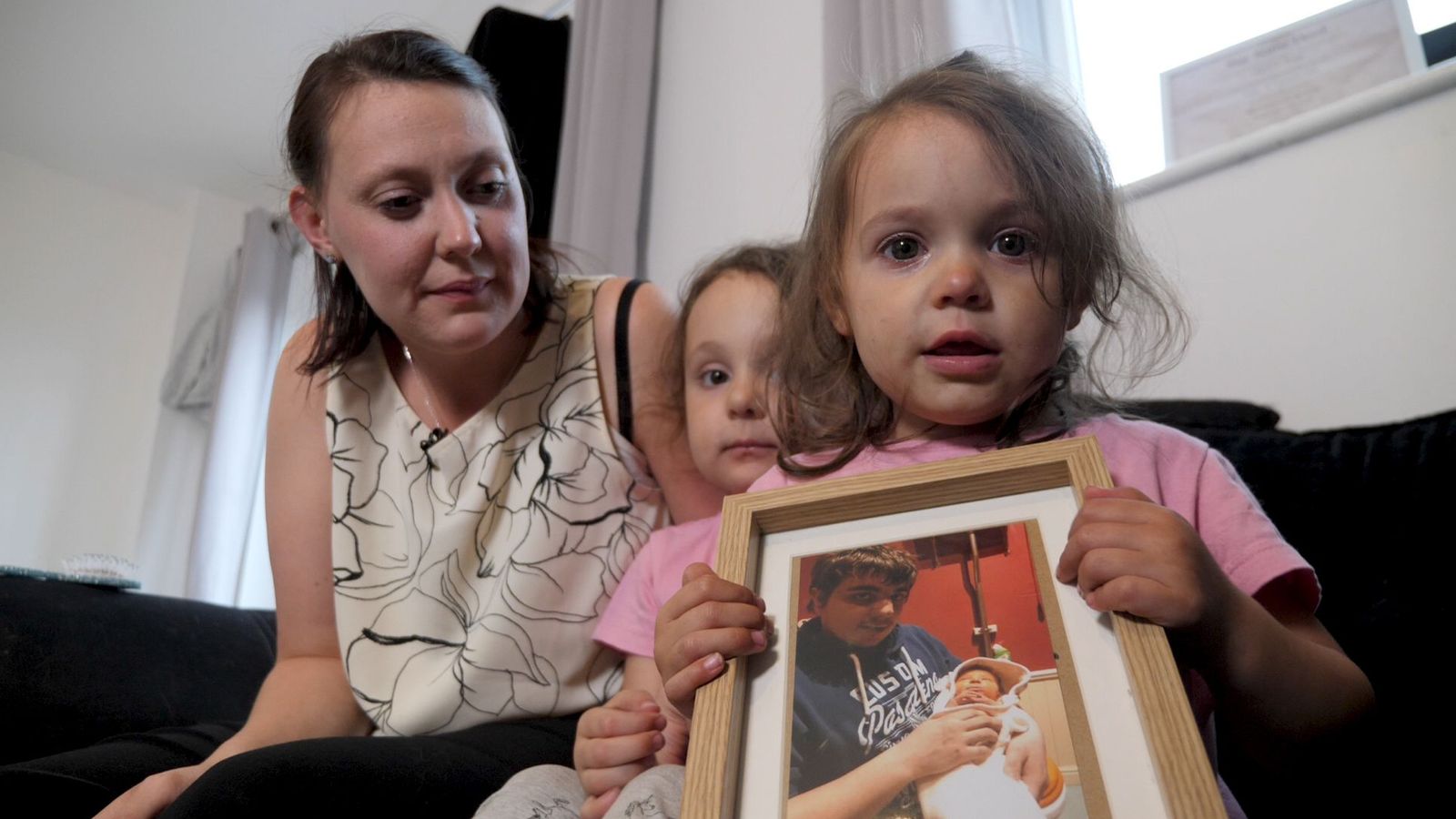Tens of thousands of children are estimated to have been refused bereavement support payments because their parents never married – four years after the government was told its policy is “discriminatory”.
The current system means the surviving partner of a couple who never married is not entitled to financial help for themselves or their children.
The Liberal Democrat leader Sir Ed Davey told Sky News the government’s failure to change the law in spite of being found to be in breach of human rights is “a scandal”.
One struggling mother has described the system as “archaic”.
Laura Allen is a 26-year-old mother of two little girls – four-year-old Phoebe and two-year-old Isabelle.
Their plight is all the more painful because Ms Allen and the girls’ father Ryan would have been married by now – had 27-year-old Ryan not been killed in a head-on collision nearly two years ago.
When we meet at Ms Allen’s home in North Yorkshire, she tells us her wedding day to Ryan would have been just a week and a half earlier.
Briton fatally struck by helicopter blade while on holiday in Greece named as Jack Fenton
Politics live: Sunak accused of ‘mansplaining’ in TV debate – and has Truss taken back her job offer to him?
Parched England could see drought in August if hot, dry weather persists, Environment Agency has warned
Fighting back tears, Ms Allen says thoughts of planning a wedding turned to arranging a funeral.
She said: “It’s horrendous. You have these moments when you think ‘I’m 26 with two kids and no partner. How am I in this situation you don’t expect to be in until you’re so much older and have made that life for yourself – made that blanket’.
“You would think that to have two partners who have made such a commitment and can prove they’ve lived together for so long, and have a family together, why should they not have the same entitlements as somebody who has it on paper that they are husband and wife?”
Ms Allen is a teaching assistant but also does online customer services after the girls have gone to bed.
Ryan worked as a classic car restorer and paid national insurance but had no pension or savings.
Ms Allen says there’s “nothing to spare” once the rent, bills and food have been paid for.
“I’ve gone from raising two children with a partner who I was intending to marry – to then losing that income as well as losing him and still expecting to pay the same bills and look after the kids but by myself without any back up,” she says.
“Without the support of my family, I’d be sinking.”
I ask Ms Allen what “sinking” would mean for her.
She fights back tears, saying: “Bills being unpaid; rent being unpaid; no food; no transport for work.”
For Ms Allen, Bereavement Support Payments would amount to £9,800 in total – including an initial payment of £3,500 with the rest paid over 18 months.
‘How can the government be so cruel?’
Ms Allen has joined the campaign for equality for those who’ve lost a partner – but it’s a fight others have been waging for over a decade.
Siobhan McLaughlin eventually won her case against the government when the UK’s Supreme Court ruled in 2018 that the policy was “discriminatory”.
Ms McLaughlin, whose partner John died from cancer after 23 years together, had to take on three jobs to support their four children.
But four years after that the government still hasn’t changed the law.
She says: “Did I think it was going to take this length of time? I don’t think any of us did. I honestly thought the government would have said ‘we hold our hands up. We did just forget about these children and we’re going to rectify it as soon as possible. But they didn’t.”
The campaign group the Childhood Bereavement Network has calculated around 14,500 families with 24,500 children have missed out on financial help since the 2018 court victory.
Alison Penny, director of the Childhood Bereavement Network, says: “Every day a club no one wanted to join gains four new members – cohabiting families where one parent has died.
“This group of families has been left in limbo, waiting to hear how the government will put this injustice right.”
Georgia Elms is an ambassador for the Campaign Group WAY: Widowed and Young.
She was widowed in 2006 at the age of 36 when her husband died suddenly.
They had a one-year-old daughter and Ms Elms found out she was pregnant the next day.
In 2010 she began campaigning for those who aren’t married to have the same rights but says they feel like they’re being ignored by the government.
She says: “They just don’t give any answers.
“It’s just like how can they be so cruel? These are real people’s lives and children that are suffering. These people cannot afford to live and they need this money.”
‘A total scandal’
The campaign is being supported by the Liberal Democrat Leader Sir Ed Davey who lost both his parents at the age of 15 and supports bereavement issues.
Two and a half years ago, Sir Ed raised the issue in the Commons and the prime minister said “we will do what we can to remedy it”.
He said: “The government’s just dragged its feet. You give governments a little bit of time when they lose a court case to work out how they’re going to change the law but that’s a matter of weeks and months not years.
“Take the party politics out of this. I think it’s a total scandal. I think the media should be reporting this and shouting about it from the tops of the roofs. This is a government failure on an extraordinary scale.”
A spokesman for the Department for Work and Pensions said: “We are finalising the legislation and then we hope to make these changes as soon as parliamentary time allows.
“Once approved by Parliament, the changes will apply retrospectively from 30 August 2018, with any backdated payments being made as lump sums.”
“The death of a loved one is devastating, and can also come with significant financial implications.
“These proposals will extend eligibility to Bereavement Support Payment and Widowed Parent’s Allowance to bereaved cohabitees with dependent children who were living with their partner on the date of death.
“It will mean more families can access support during the most difficult of times.”
Q&A:
What is Widowed Parents’ Allowance & Bereavement Support Payment (BSP)?
Bereavement Support Payment is a payment someone can claim if their husband, wife or civil partner dies.
The money aims to help ease some of the financial pressure faced when bereaved.
Bereavement Support Payment has replaced Bereavement Allowance (previously Widow’s Pension), Bereavement Payment, and Widowed Parent’s Allowance.
Who is eligible for Bereavement Support Payment (BSP)?
Currently, an individual may be entitled to Bereavement Support Payment if their wife, husband or civil partner died in the last 21 months.
An individual is eligible if their partner paid National Insurance contributions for at least 25 weeks in one tax year or died because of an accident at work or a disease caused by work.
When their partner died they must have been under state pension age.
The payments are funded by National Insurance payments.
How much would someone receive?
If someone is eligible they would be entitled to the first payment and then 18 monthly payments.
There is a higher and lower rate for the payment which is dependent on whether the individual is entitled to child benefits.
The higher rate is the first payment of £3,500 and then £350 a month. That is a total of £9,800.
What have the courts said?
In Siobhan McLaughlin’s case, the Supreme Court decided that by not offering the support payments (at that time it was the previous version of bereavement support called Widowed Parent’s Allowance) to the surviving partner and/or their children because they are unmarried, breaches their human rights.
The decision did not change the legislation that sets out the rules for who is entitled to support, that is down to Parliament.
Since that Supreme Court ruling, two unmarried fathers have taken the government to court over the same issue in Bereavement Support Payment and won their cases against the government.
What is the delay?
The government have indicated they will make changes to the legislation via a “Remedial Order”.
This is a statutory instrument by which legislation that is incompatible with human rights can be amended, without a whole new act of Parliament being passed.
The government laid a draft remedial order in parliament in July 2021.
There was then a window for MPs, the Joint Committee on Human Rights and others to give feedback, which ran until 12 November 2021.
The Department of Work and Pensions had said they are now reviewing that feedback after which the draft order will be laid for another period before it can be approved by parliament and made law.






















